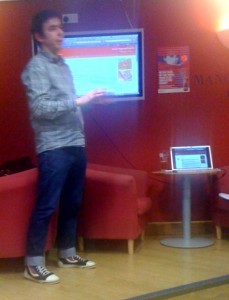As part of what might be considered my extra-curricular activities, I’ve been attending Manchester’s thriving Social Media Cafe from when it began back in November 2008. I initially got involved with this group more from the perspective of being a director of the Manchester Jazz Festival and a Manchester music blogger in the guise of The Ring Modulator. The interesting thing is that it usually turns out to be more relevant to my UKOLN ‘day’ job, this being the case when Julian Tait, one of the media cafe’s founders, asked me to give a talk on Linked Data, which I duly did last year.
The crossover is even more apparent now that Julian, as part of his role in Future Everything, has become involved in a project to make Manchester the UK’s first Open Data City. He spoke about this at the last excellent cafe meeting, and did a great job helping amplify some thoughts I’ve been having on this.
Julian posed the question of what an open data city might mean, suggesting the notion that in a very real sense, data is the lifeblood of a city. It allows cities to function, to be dynamic and to evolve. If the data is more open and more available, then perhaps this data/blood can flow more freely. The whole city organism could then be a stronger, fitter and a healthier place for us to live.
Open data has the potential to make our cities fairer and more democratic places. It is well known that information is a valuable and precious commodity, with many attempting to control and restrict access to it. Julian touched on this, inviting to us to think how different Manchester could be if everyone had access to more data.
He also mentioned the idea of hyper-local data specific to a postcode that could allow information to be made available to people on a street by street scale. This sounds very like the Postcode Paper mentioned by Zach Beauvais from Talis at a recent CETIS meeting. There was mention of the UK government’s commitment to open data via the data.gov.uk initiative, though no specific mention was made of linked data. In the context of the Manchester project, I think the ‘linked’ part may be some way down the road, and we’re really just talking about the open bit here. Linked Data and open data do often get conflated in an unhelpful way. Paul Walk, a colleague of mine at UKOLN, recently wrote a blog post, ‘Linked, Open, Semantic?‘ that helps to clarify the confusion.
Julian pointed us to two interesting examples, ‘They Work For You‘ and ‘MySociety‘, where open data is being absorbed into the democratic process thereby helping citizens hold government to account. There’s also the US innovation competition, ‘Apps for Democracy‘, Julian quoting an ear-catching statistic that an investment of 50,000 dollars is estimated to have generated a stunning return of 2.3 million dollars. Clearly an exemplar case study for open data there.
4IP‘s forthcoming Mapumental looks to be a visually engaging use of open data, providing intuitive visualisations of such things as house price indexes and public transport data mappings. Defra Noise Mapping England was also mentioned as the kind of thing that could be done, but which demonstrates the constraints of not being open. Its noise data can’t actually be combined with other data. One can imagine the benefits of being able to put this noise pollution data with house prices or data about road or air traffic.
Another quirky example mentioned was the UK developed SF Trees for iPhone app that uses San Francisco Department of Public Works data to allow users to identify trees in the city.
So open data is all about people becoming engaged, empowered, and informed. Julian also drew our attention to some of the potential risks and fears associated with this mass liberation of data. Will complex issues be oversimplified? Will open transparent information cause people to make simplistic inferences and come to invalid conclusions? Subtle complexities may be missed with resulting mis-information. But surely we’re better off with the information than without? There are always risks.
Open data should also be able to provide opportunities for saving money, Julian noting that this is indeed one of the major incentives behind the UK’s ‘smarter government‘ as well as US and Canadian government initiatives.
After the talk there was some lively debate, though I have to say I was somewhat disappointed by the largely suspicious and negative reaction. Perhaps this is an inevitable and healthy wariness of any government sanctioned initiative, but it appears that people fear that the openness of our data could result in some undesirable consequences. There was a suggestion for example, that data about poor bin collection in an area could adversely affect house prices, or that hyper-local geographical data about traffic to heart disease information websites could be used by life insurance companies. Perhaps hyper-local data risks ghettoising people even more? Clearly the careful anonymisation of data is very important. Nevertheless, it was useful to be able to gauge people’s reactions to the idea of an open data city, as any initiative like this clearly needs people on board if it is to be a success.



